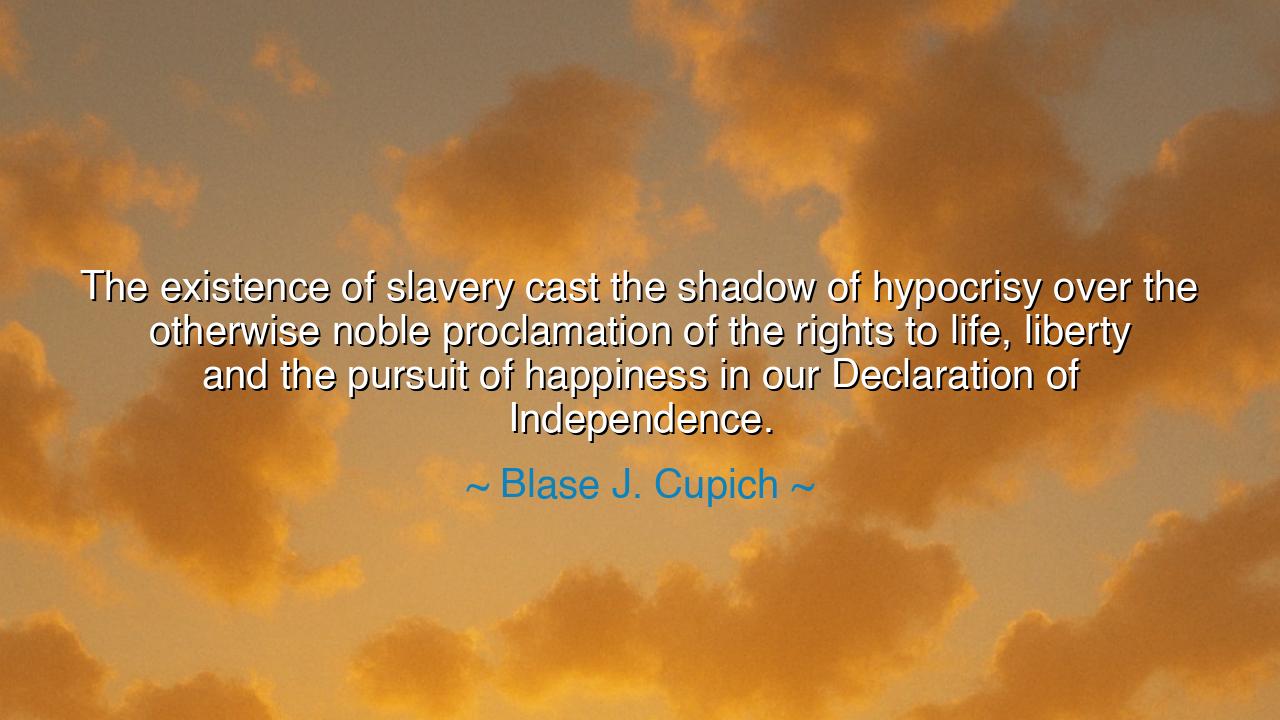
The existence of slavery cast the shadow of hypocrisy over the
The existence of slavery cast the shadow of hypocrisy over the otherwise noble proclamation of the rights to life, liberty and the pursuit of happiness in our Declaration of Independence.






When Blase J. Cupich declared, “The existence of slavery cast the shadow of hypocrisy over the otherwise noble proclamation of the rights to life, liberty, and the pursuit of happiness in our Declaration of Independence,” he did not speak merely of the past—he spoke to the conscience of all ages. His words pierce like a bell of truth through the fog of history, reminding us that even the brightest lights of human progress can be dimmed when they rise above a foundation of injustice. The Declaration of Independence, that sacred document which dared to proclaim equality and freedom, was indeed a noble flame. Yet, as Cupich laments, the existence of slavery placed a long and bitter shadow upon it—a contradiction so profound that it still echoes through the soul of a nation.
The origin of this paradox lies at the birth of America itself. In 1776, the Founding Fathers penned words that changed the world—“that all men are created equal, that they are endowed by their Creator with certain unalienable Rights.” These words burned with divine idealism, yet they were written in a land where millions were enslaved, their humanity denied, their liberty stolen. Thus, as Cupich observes, the founding promise of freedom bore within it a wound. The very soil from which liberty was proclaimed was stained with bondage. The shadow of hypocrisy was not cast by malice alone, but by blindness—the blindness of men who saw the light of freedom yet failed to extend it to all.
History gives us witnesses who stood within that shadow and refused to be silent. Among them was Frederick Douglass, once a slave, who rose to become one of America’s greatest voices of truth. On July 5, 1852, in his speech “What to the Slave is the Fourth of July?” Douglass thundered, “This Fourth of July is yours, not mine.” He exposed the hypocrisy Cupich describes with unflinching clarity: that a nation celebrating liberty while holding men in chains could not yet call itself free. His voice, like a prophet’s, demanded that the noble proclamation of the Declaration be made real—not only written on parchment, but inscribed upon the hearts of all. In Douglass’s struggle, we see the beginning of redemption: that truth, once named, begins its work of healing.
Cupich’s words also remind us that nobility and hypocrisy often walk side by side in the story of humankind. It is easy to proclaim virtue; it is harder to live it. Every civilization, every generation, faces this same test—to bring its ideals into harmony with its actions. The founders dreamed of life, liberty, and happiness, but their dream was imperfectly lived. Yet in their imperfection lies both warning and hope. For it teaches us that justice is not born perfect, but must be pursued continually, with courage and humility. The shadow that Cupich speaks of is not eternal; it can be dispelled—but only by those willing to face it.
The struggle to erase that shadow came through blood and sacrifice. Abraham Lincoln, in his own time, took upon himself the burden of this contradiction. In the midst of civil war, he sought to reconcile America’s actions with its founding words. The Emancipation Proclamation was not merely an act of politics; it was a moral reckoning, a moment when a nation attempted to step out of hypocrisy and into the light of truth. Lincoln understood that a house divided between freedom and slavery could not stand. In his courage, we see the fulfillment of Cupich’s warning: that noble ideals demand noble deeds, and that the price of integrity is often great.
But even after the shackles were broken, the shadow remained. The legacy of inequality, racism, and injustice continued to haunt the nation. Cupich’s words remind us that the work of aligning our proclamations with our practices is never finished. The Declaration still calls across the centuries, not as a relic of perfection, but as a promise unfulfilled—a covenant waiting to be completed by every generation. It is a mirror in which each of us must look and ask: Do I live by the light I profess to believe in? For hypocrisy is not only the sin of nations, but of souls.
Thus, let this teaching be remembered: words of virtue are empty unless carried by deeds of justice. It is not enough to proclaim freedom; we must ensure it. It is not enough to honor equality; we must embody it. Each of us is called to continue the work that history began—to lift our own age out of its shadows, whether they be of prejudice, greed, or indifference. Let us, then, learn from Cupich’s wisdom: that the greatness of a people is not found in its proclamations, but in its willingness to face its own contradictions with courage and grace. For when the shadows are acknowledged and overcome, the light of life, liberty, and happiness can finally shine—not for some, but for all.






AAdministratorAdministrator
Welcome, honored guests. Please leave a comment, we will respond soon